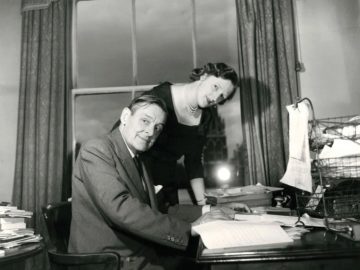Erica Wagner in The New Statesman:
 It is impossible not to be moved by the final pages of Robert Crawford’s Eliot: After The Waste Land, in which the 20th century’s greatest poet at last finds contentment with his young wife Valerie. Much more than contentment: “I am madly happy in being her husband,” Eliot wrote to his friend Violet Schiff upon the couple’s return from honeymoon in 1957. The wedding – and indeed, the whole courtship and relationship – between the 68-year-old Nobel Laureate and his 30-year-old Yorkshire-born secretary had been a secret from nearly everyone who knew them until the very last moment. The ceremony had been conducted at 6.15 in the morning, by special licence from the Archbishop of Canterbury, so as to evade the attentions of the press.
It is impossible not to be moved by the final pages of Robert Crawford’s Eliot: After The Waste Land, in which the 20th century’s greatest poet at last finds contentment with his young wife Valerie. Much more than contentment: “I am madly happy in being her husband,” Eliot wrote to his friend Violet Schiff upon the couple’s return from honeymoon in 1957. The wedding – and indeed, the whole courtship and relationship – between the 68-year-old Nobel Laureate and his 30-year-old Yorkshire-born secretary had been a secret from nearly everyone who knew them until the very last moment. The ceremony had been conducted at 6.15 in the morning, by special licence from the Archbishop of Canterbury, so as to evade the attentions of the press.
The bride’s parents were in attendance, and Eliot’s lawyer: no one else. Eliot’s devoted colleague Geoffrey Faber had been informed but, as he told the Daily Mail, “I am not in the habit of getting up at five in the morning to attend wedding ceremonies.” Eliot’s friend of nearly 20 years’ standing, Mary Trevelyan, learned of his actions after she returned from her holiday to find a postcard dated 9 January: “On Thursday the 10th January I am being married to Valerie Fletcher,” Eliot had written. “Naturally I thought Tom had gone out of his mind,” Mary would write of this moment: she had known nothing of any personal relationship between Eliot and “Miss Fletcher”, as he had always referred to her in Mary’s presence. In the years prior to his marriage, Eliot had shared a flat with the critic John Hayward; Hayward felt abandoned by the poet, and as Crawford writes, took to describing himself as “the Widow”.
More here.
